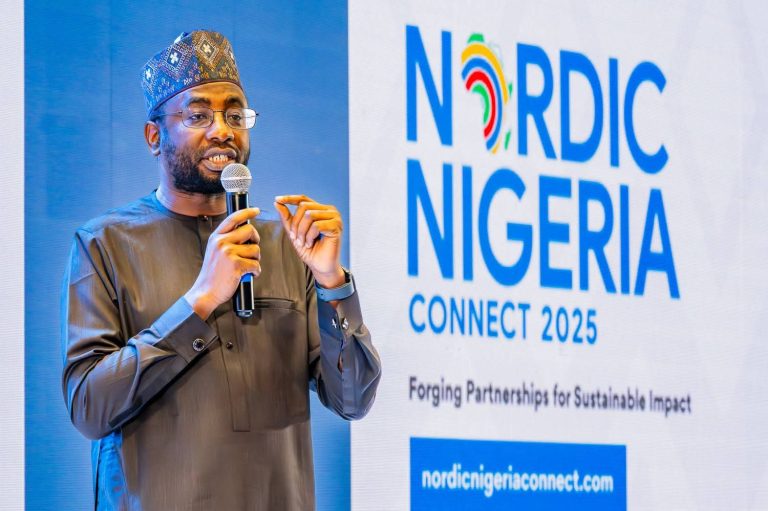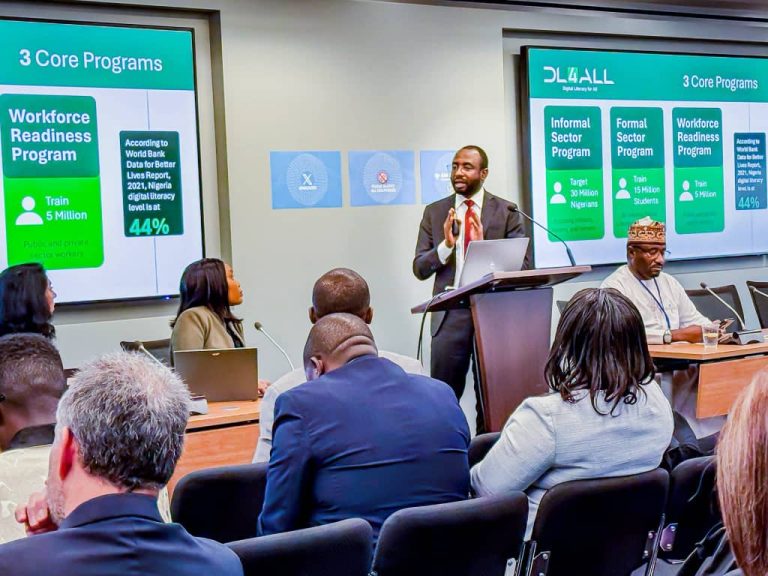
ByOlusegun Ayeoyenikan
The National Agency for Science and Engineering Infrastructure (NASENI) is mandated to make available in the Nigerian market the primary and intermediate capital products required for machine and equipment design, fabrication, and mass production to provide an enabling environment for sustainable industrialization of the country.
The agency, established in 1992, continues to make progress in Nigeria’s technological advancement, driving home-grown innovation and improving manufacturing capabilities. While playing this role, NASENI has successfully developed more than 150 innovative products as well as prototypes bolstered by its Development Institutes and Centres, thus contributing to fostering excellence in science, engineering technology and manufacturing.
Commendable so far, however, the NASENI’s socio-economy trajectories or real-time impacts in the country, its previous challenges included lack of patronage of its technologies and products by local entrepreneurs or businesses, exacerbated by low R&D results commercialization activities, leaving most research outcomes to waste away on shelves. True, NASENI always could boast of having various innovative products but it had very weak linkage with Small & Medium Enterprises (SMEs) or big corporations whose day-to-day activities required the use of various technologies, machines and equipment already developed by the agency.
As this particular challenge persisted over the years, then came on Monday 4th September 2023 a new executive Vice Chairman/chief executive, Mr. Khalil Suleiman Halilu who was appointed by President Bola Ahmed Tinubu to lead NASENI. It is good to note that the President Tinubu himself is the Chairman of the Governing Board of NASENI in line with the agency’s establishment Act 2004. Immediately on assumption of office, Halilu like a man who knew where the proverbial shoes pinched the most brought a dramatic management change of focus towards full commercialization of NASENI’s resources, to make available in the market and also end users its R&D products, machines and other equipment to boost the economy.
NASENI today stands as a beacon of hope for Nigeria’s indigenous technological advancement, aligning with its core mission of fostering needed dynamic science and engineering Infrastructure for national progress. The agency under the leadership of Halilu has articulated a bold vision and promoted a shared management-staff philosophy hinged on 3Cs principles of Creation, Collaboration and Commercialization to fuel Nigeria’s innovation and sustainable future. This approach has indeed opened more doors to result-based NASENI’s partnerships with both national and international corporate communities.
Inspired by previous experience as a techpreneur and businessman before his appointment to lead NASENI, Halilu’s leadership model is to do everything to conserve resources, avoid duplication of efforts, and shorten go-to-market time. What this means is that wherever NASENI finds serious partners who are already operating in areas of interest, it will work with them to improve the agency’s products and take these products to the market. As a government agency, Halilu said NASENI under him is not out to compete with the private sector. Instead, the agency will serve as partners and enablers, helping the private sector to achieve everything from design to testing, or helping companies in scaling-up production capacity and to seek out new markets.”

As a result of this strategy, within a space of one year the agency had unveiled to the general public some branded technological products manufactured in collaboration with its partners. They included solar irrigation systems, electric vehicles (ranging from tricycles to motorcycles), NASENI home solar system, animal feed milling machines, laptop, smartphone, solar street lamp and lithium battery. All these efforts were geared towards creating jobs and to reduce import bills.
Halilu brought a mix of deep private sector experience and working knowledge of the public sector, amassed from delivering high-impact technology and digital solutions across both sectors. In the private sector, before his sojourn in NASENI, Khalil Halilu had founded two start-ups-Shap shap technologies Limited, a Nigerian logistics start up focusing on the last-mile delivery market, as well as Africa’s first on-demand commodity marketplace, an innovation incubator and the CANs-the first eco-friendly Technology Hub in West Africa. In his consulting work, Halilu built and deployed solutions tailored to improve the quality of government-citizen engagement, election monitoring including support for victims of gender-based violence amongst others.
In September 2023, Halilu hit the ground running with the launching of a NASENI Strategic Launchpad which simplified attainable goals concerning the mandate, vision, mission and operations of the Agency into short, medium and long-term plans. Secondly, he changed the NASENI corporate logo to portray a predominant blue colour to reflect the agency’s operational affinity with the private sector or the business world. Halilu introduced a well thought out corporate plan called ‘strategic Launchpad’ which outlined four pillars that encapsulated the agency’s vision namely: Enhancing Nigeria’s Manufacturing Capacity, Reducing Nigeria’s Import Dependency through Research and Development, Strategically Repositioning NASENI and Leveraging the Comparative Advantages of Nigeria’s 36 States and the Federal Capital Territory.
Halilu’s philosophy on the need for a strategic plan before getting down to business was in line with the popular adage that “he who fails to plan, has planned to fail already”. The NASENI strategic document amongst others clarified in simple languages the mandate, objectives, targets and achievable goals of the agency within a stipulated or achievable time-frames, taking into account the factors of human, material and other resources given to the agency by the Federal Government. So far, the document has provided an effective guide for deployment of resources, its optimization and measurements leading to all the achievements which everyone now could see or touch.
The past 12 months: NASENI had deliberately signed critical Memorandum of Understandings (MOUs) with local and international partners aimed at advancing Nigeria’s economic growth and development. Some of them include a $150 million deal with Schenzen LEMI Technology Development Company Ltd to establish a lithium battery manufacturing and processing factory in Nigeria.
It signed agreements with three other Chinese companies for new projects valued at $2 billion. They include Shanghai Launch Automotive Technical Co Ltd – to establish a new energy automobile facility for the production of new energy electric vehicles; China Great Wall Industry Corporation-for the turnkey delivery of Unmanned Aerial Vehicles (UAV) assembly line projects; and Newway Power Technology Company Ltd-for the transfer of technology on lithium batteries, electric vehicles and allied technologies.
Others are: Galaxy Backbone Ltd to support NASENI’s High Performance Computing 2.0 projects; Rural Electrification Agency (REA) to provide technical support assistance and expertise using home grown renewable energy technologies; and PT Saputra Global Harvest of Indonesia to establish coal-based fertilizer plants in Nigeria. NASENI had signed MoU with Nasarawa State Government and Bobtrack Tractors to establish a tractor assembly and production factory at its Agricultural Machinery and Equipment Development Institute (AMEDI), Lafia to enhance food security; the Ministry of Defence and DICON to establish an ammunition production factory; a $21.7 million counterpart funding with the Technical Agency of the Czech Republic (TA-CR) for take-off of Delta-2 Projects; Niger State government for Agric mechanization; Family Homes Funds Ltd for affordable housing development; and Caverton Helicopters for the establishment of a drone assembly plant, a drone training school, and a service centre for helicopters; amongst other agreements.
NASENI is also collaborating with the Federal Ministry of Agriculture and Food Security to deploy existing technical competencies and exchange of resources by the two institutions to improve Agro-allied-industries development targets, climate change mitigations and smart solar irrigation aimed at dry-season farming. These partnerships will have a profound impact, generating hundreds of thousands of direct and indirect jobs, contributing significantly to Nigeria’s economic growth, agricultural sector, food security, and renewable energy development. The efforts have no doubt positioned NASENI as a catalyst for Nigeria’s economic transformation, driving progress in critical sectors such as agriculture, healthcare, housing, energy, transportation, ICT and manufacturing.
The entry of Mr. Khalil S. Halilu has brought into the agency many strategic infrastructure development projects, including cutting-edge research facilities and technology hubs installed at NASENI headquarters and its development institutes. He has revitalised partnerships with local and international stakeholders, fostering collaboration and knowledge sharing, innovative initiatives to promote entrepreneurship, job creation, and economic growth.
He has not left any stone unturned in contributing to the promotion of the green energy initiative of the Federal Government and mitigation of climate change. His recent partnership with Portland Gas Limited resulted in the establishment of NASENI-Portland CNG Conversion and Training Centre at Utako, Abuja which has raised the bar of sustainable alternative fuel solution to reduce greenhouse gas emissions and save fuel costs for vehicle owners.
Also, Halilu did not neglect the issue of staff welfare and human capital development. Notable achievements in this area were the introduction of enhanced staff welfare package and training programmes including capacity building initiatives described as unprecedented. As at today, there is no staff of NASENI (from low to highest ranks) who have not attended one form of training or the other within the range of local and international trainings to improve work performance; inspiring a new mindsets and attitudes to work even as he is deliberately engineering new NASENI generation scientists, engineers, and innovators including other support staff to dream big for the agency. This new trend of focusing on staff development has created a renewed sense of purpose and optimism by the entire workforce. Many staff are saying that “it is a new NASENI indeed under the leadership of Khalil Suleiman Halilu as executive vice chairman and chief executive”
The NASENI family now is cultivating a culture of innovation, emphasizing continuous training and skill development to meet global standards and also to produce world-class products. This commitment to leveraging NASENI’s capabilities and fostering a culture of innovation has positioned it to make a substantial impact in Nigeria and beyond.
As NASENI continues to move ahead with Nigeria’s technological advancements and infrastructure development focus, the impacts on the economy will be profoundly felt soon. With focus on innovation, collaboration, and transformative leadership, the agency is set to make remarkable differences in shaping Nigeria’s technological landscapes toward economic prosperity. Exciting times lie ahead for NASENI as it continues on its forward-looking paths to propel innovation and economic growth for Nigeria under Mr. Khalil Suleiman Halilu as NASENI CEO. It’s truly a remarkable one year of renewed hope, 365 days of giant strides and transformation of the agency.
Olusegun Ayeoyenikan is the Director of Information, NASENI. He writes from the agency’s headquarters in Abuja.



